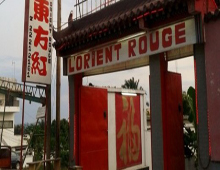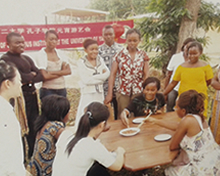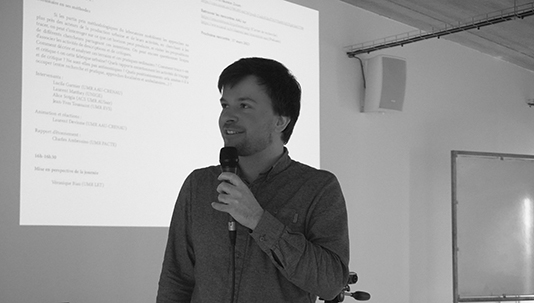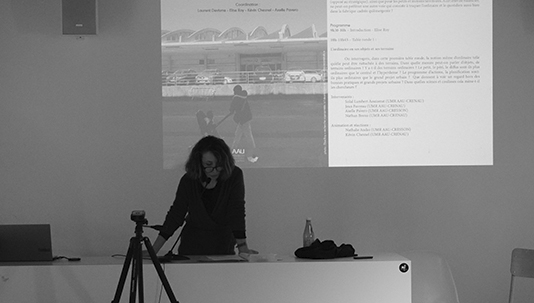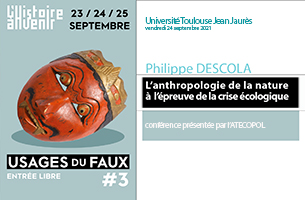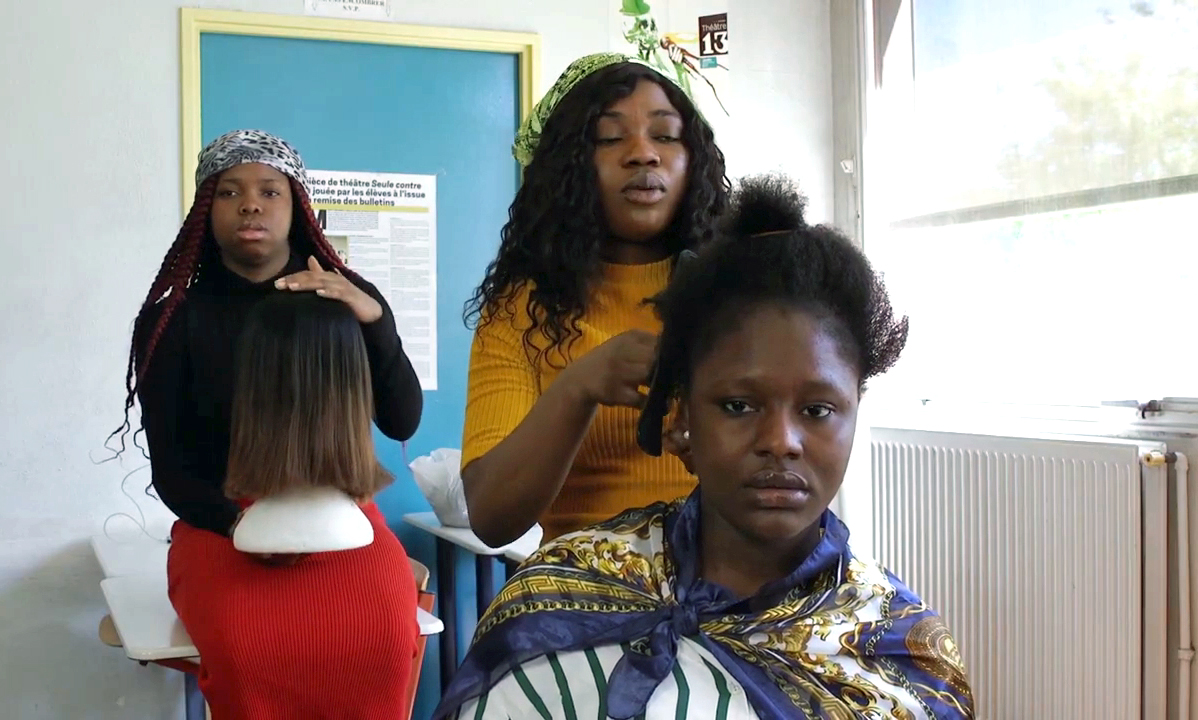Chapitres
- Introduction par Antoine KERNEN11'47"
- Introduction par Lucia CANDELISE09'15"
- Intervention de Julienne NGO LIKENG : "Network Marketing of Health Products and Dietary Supplements in Cameroon. The Example of Forever and Edmark Products" et discussion avec la salle38'05"
- Intervention de Lucia CANDELISE et d'Antoine KERNEN : "The Diagnostic Machine. From Faith to Science"32'30"
- Discussion18'11"
Notice
Appropriation des produits médicaux venant de Chine au Cameroun
- document 1 document 2 document 3
- niveau 1 niveau 2 niveau 3
Descriptif
After a period of dissemination of so-called “traditional” Chinese medicine in Africa thanks to Chinese practitioners working in the public sector (hospitals), or setting up private practices in towns and proposing treatments such as acupuncture, moxibustion and Chinese pharmacopoeia, China’s contribution to the health sector is now characterized by diverse forms of appropriation on the part of local actors.
Surprisingly, practices qualifiable as “traditional” Chinese medicine only remain present in the form of the Chinese medical teams working in the country’s three hospitals, whereas private practices are tending to disappear. Several practices opened by the Chinese have now shut, and Chinese entrepreneurs’ visibility in the health sector has sharply declined.
If the Chinese origin of products or medical practices tends to be “camouflaged”, China’s influence nonetheless remains considerable. Many Cameroonian practitioners, for instance, use a Chinese-made diagnostic machine, locally known as “the scanner”, and several Chinese groups are highly active in the network marketing of dietary supplements.
This panel aims to present empirical studies that testify to the appropriation and “camouflaging” of Chinese practices and products in the Cameroonian health sector.
Intervention / Responsable scientifique
Dans la même collection
-
Définition et enjeux de la "vraie médecine chinoise" en contextes chinois et africains
PordiéLaurentObringerFrédéricBourdariasFrançoiseMicollierÉvelyneThe dissemination of Chinese medicine in the global context is contributing increasingly to the reconfiguration of local therapeutic fields. It tends to modify relations between the different forms of
-
Géopolitique du patrimoine ; Perspectives croisées Chine-Afrique
BodolecCarolineLoumpet-GalitzineAlexandraCousinSaskiaTrémonAnne-ChristineSaatenangDominiqueIncreasing State and local community interest in Intangible Cultural Heritage (ICH) highlights, as with other UNESCO programmes, the stakes that now crystallize different acceptations of the notion of
-
Ouverture scientifique du colloque EsCA
Loumpet-GalitzineAlexandraArrifTeddyBourdariasFrançoiseDittgenRomainDozonJean-PierreEspaces de la culture chinoise en Afrique : diffusion, agencements, interactions Etudes du Soft power chinois en Afrique et des espaces socio-culturels ouverts par des communautés chinoises et
-
Chinese Spaces and Cultural Makers in African Cities
ChunguGeraldDittgenRomainGuo ChatelardSolangeZackTanyaEspaces de la culture chinoise en Afrique : diffusion, agencements, interactions Etudes du Soft power chinois en Afrique et des espaces socio-culturels ouverts par des communautés chinoises et
-
Chinese spaces of diffusion and interaction in Africa
BatchelorKathrynDozonJean-PierreProcopioMaddalenaShumanAmandaVergèsFrançoiseGilbertCatherinePolitiques au moment des indépendances africaines, les canaux de diffusion et d'interaction entre les pays africains et la Chine sont surtout appréhendés depuis quelques années en termes économiques
-
Ouvrage : La Chine en Afrique du Sud / China in South Africa
DittgenRomainHoUlfriedaParkYoon JungUlfrieda HO (Journalist) Author of “Papers sons and Daughters; Growing up Chinese in South Africa” (Paperback Ed. 2012) / Yoon JUNG PARK (Convenor, China in Africa-Africa in China Network)
-
Chinese – African Figures of inbetweeness
GieseKarstenLamKatyMarfaingLaurenceSaatenangDominiqueThe Chinese-African encounter – a source of creativity, adaptation, but also of disorder – is transforming African societies. Whether talking about the Chinese present in Africa, or Africans
-
Produits chinois en Afrique : réseaux de diffusion et modes de consommation
KernenAntoineHahnHans PeterKhan MohammadGuiveParkYoon JungThis panel intends to offer a new perspective on the massive arrival of Chinese products effecting Africa for the past fifteen years. Available in markets in even the most remote villages of the
-
Arts contemporains : imaginaires de la Chine en Afrique et de l'Afrique en Chine
Loumpet-GalitzineAlexandraDíaz CastilloRobertoSimbaoRuth KerkhamAdogonyBaudoin EulogeDaoMyriamLinks between China and Africa today tend to be thought of, primarily, in economic and/or political terms. The arts, or culture more broadly, are given relatively little attention, for they are
Avec les mêmes intervenants et intervenantes
-
Produits chinois en Afrique : réseaux de diffusion et modes de consommation
KernenAntoineHahnHans PeterKhan MohammadGuiveParkYoon JungThis panel intends to offer a new perspective on the massive arrival of Chinese products effecting Africa for the past fifteen years. Available in markets in even the most remote villages of the
-
Matinée - Partie 1 - Catégoriser les acteurs des espaces d'interaction sino-africains
Loumpet-GalitzineAlexandraKernenAntoineBourdariasFrançoiseGieseKarstenIntermédiaires, médiateurs, traducteurs ? Catégoriser les acteurs des espaces d’interaction sino-africains
Sur le même thème
-
Glozel dans les années 2020 : pour une approche ethnographique et politique du discours dans la (re…
DanosFélixL’affaire Glozel dispose encore de ses pro- et de ses anti-. Félix Danos questionne le maintien d’un malentendu entre deux parties qui pourtant souhaitent la même chose : la valorisation d’un ensemble
-
Journée d’étude I Les lucioles : art, culture et espoir dans les périphéries urbaines de Rio et de …
Capanema P. De AlmeidaSílviaFacinaAdrianaBirmanPatríciaMerklenDenisCarneiroSandra de SáDans nos paysages urbains généralisés, nous cherchons les lucioles. En leur absence, les collectifs culturels sont capables de rallumer les étoiles, comme dans les vers d’Apollinaire. Autrement dit,
-
S'installer à la campagne
LatouilleOphélieOphélie Latouille présente son travail de recherche doctorale consacré aux mobilités résidentielles vers les zones rurales et aux transitions professionnelles vers le non-salariat, dans des contextes
-
Prendre la mesure de nos milieux de vie
GramagliaChristelleChristelle Gramaglia, chercheuse à l'INRAE de Montepellier, présente un autre de ses terrains d'étude : Fos-sur-mer.
-
Prendre la mesure de nos milieu de vie
L’HerGwendolineGwendoline L'Her introduit la thématique de l'après-midi : prendre la mesure de nos milieux de vie.
-
Las Playitas ( VO en espagnol sous-titrée en français)
RaoulxBenoîtA Maracaibo, le marché populaire de Las Playitas constitue une scène représentative d’une ville vénézuélienne. Dans ce lieu de la consommation s’entrechoquent le rêve collectif d’ascension sociale et
-
Table ronde 1 : L’ordinaire en ses objets et ses terrains - Introduction
AudasNathalieChesnelKevinKévin Chesnel et Nathalie Audas introduisent la table ronde 1 en présentant les thématiques et questionnements.
-
Accueil et présentation
ThomasRachelRoyÉliseElise Roy introduit la journée 5 du cycle des Rencontres AAU " L’ordinaire de la fabrique urbaine", fabrique institutionnelle ou fabrique émergente portée par les acteurs dit "ordinaires" et en ouvre
-
La circulation des textes grecs ou les chemins du savoir
HoffmannPhilippePour un printemps des savoirs en Méditerranée C ycle de conférences organisé par la Maison méditerranéenne des sciences de l'homme, 31 mars 2009, Aix-en-Provence Rencontre avec : La Méditerranée ou
-
L’anthropologie de la nature à l’épreuve de la crise écologique. Rencontre avec Philippe Descola
DescolaPhilippeLa crise de la biodiversité et le changement climatique, parce qu’ils posent clairement la question de l’habitabilité de cette planète dans un futur proche, invitent à réfléchir aux mécanismes qui
-
le resilience assessment framework, un outil de diagnostic pour les villes et les secteurs s…
Par Maria Adriana Cardoso, chercheuse au Laboratoire du Génie Civil du Portugal, accompagnée de Maria João Telhado, Cheffe de division Environnement et énergie, Municipalité de Lisbonne dans le cadre
-
Les filles d’Eugénie
Trois rencontres avec un génie


